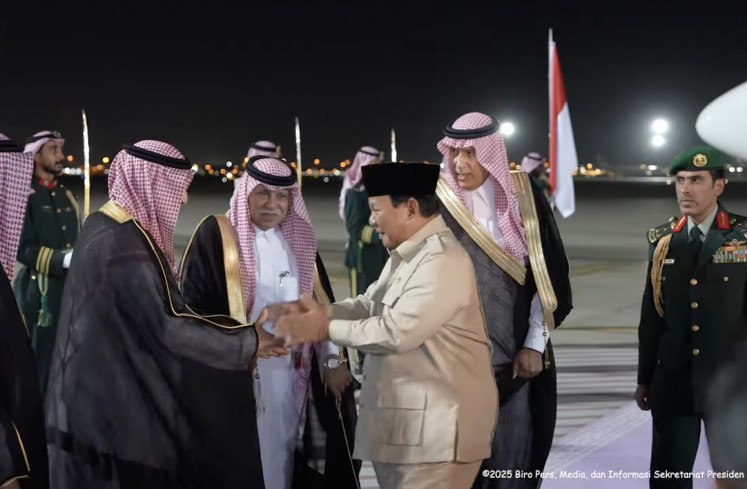Popular Reads
Top Results
Can't find what you're looking for?
View all search resultsPopular Reads
Top Results
Can't find what you're looking for?
View all search resultsIntegration of economies across the globe
One important thing China’s leaders have been able to show is unity, even when its economy declined during this crisis to levels considered critical to its development — at around 5 percent growth — as in the last quarter of 2008
Change text size
Gift Premium Articles
to Anyone

O
ne important thing China’s leaders have been able to show is unity, even when its economy declined during this crisis to levels considered critical to its development — at around 5 percent growth — as in the last quarter of 2008.
It is also an important development that the US, which has been able to stay competitive in global economic developments, recognizes the need for more investment in innovation and R & D in the future, especially through better education in sciences and technology.
Otherwise countries such as China will take over in the next few decades, because they are willing to invest more in R & D and in upgrading their education systems.
China has been sending up to half a million students every year to study abroad at the best tertiary institutions.
It has also been willing to hire them back to undertake research and development in China by
providing high budgets and perks.
Other countries have better tax structures than the US to provide incentives to companies to invest in more in innovations and R & D.
The big question is what China will be willing to do if it reaches the level of a great power in many fields over the next few decades. Until now, China has shown no intention of changing other nations to a Chinese civilization mode.
It is also unwilling to accept the imposition of values by others it perceives as foreign and not compatible with its own. China also has not taken any initiative to change the international order. In this sense, China can be regarded as a conservative and not a revolutionary power.
In the end, China does think the international order and value system will depend on a mix of western and non-western thoughts and values, including those of China. And that should indeed be the best solution for all, instead of having two value systems and civilizations in the future.
For this to happen, a lot more relations and contacts should be established between the West (especially the US) and China and others in East Asia, not only between leaders and the elite but also between the peoples, including through the Internet, which will be a crucial factor for the inter change.
The political systems of both sides should be open enough, so that an emerging common values system could be established during the next two to three decades. What President Obama has tried to establish in his visit to East Asia, especially during his visit to China, is an important beginning.
At the end of the 19th century it had been said that trade and economic relations were so
deep that war could not be envisaged. But the politics of the balance of power were different then, and three major wars have been waged during the 20th century.
This time, hopefully, the integration of the economies has become deeper and has happened across the whole globe. In addition to the emergence of global and regional rules, many institutions have been developed and are functioning.
This includes the creation of the G20 at the summit level. And the basic strategy of President Obama and the Chinese leadership are similar, although differences and nuances exist. But both sides need each other to be able to achieve their goals.
Nonetheless, more basic things also need to be done by the US and China, namely to have a meaningful conversation.
Since Enlightenment, in the West, life, liberty and the pursuit of happiness are truths that are self-evident. The “East”, including China, has made the case for harmony, security and a trans-generational community.
These two sets of aspirations, including their social realities, should be compared in the light of reason.
There are values in Confucian and Buddhist traditions that the West also could learn from. And there is a good deal of common ground between the two. It is not a dialogue among civilizations where one’s values are determined by the civilizations of one’s birth or religion.
And definitely this is not a trade-off between Western-versus-Asian values. Rather it should be a genuine conversation about what all human beings have in common, and how they should best organize and live their lives for the future.
Hopefully, all these efforts could bring peace, stability and development in many parts of the world, including East Asia. Regional institutions could help, but this is outside this present discussion.
The writer is the deputy chairman of the Board of Trustees, the CSIS Foundation.









